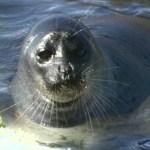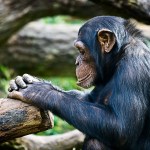Life Sciences
"I thought I better come see the bears because the next time I am in this country they will be all gone."
-- Polar bear tourist in Churchill, Man.
Ecotourism. Sounds so responsible, or least, non-exploitative. But let's face it: Anyone who flies long-distance to get close to some endangered piece of nature at risk from climate change is doing their bit to push those species that much closer to extinction. A paper published recently in the Journal of Sustainable Tourism tries to quantify the irony. "The carbon cost of polar bear viewing tourism in Churchill, Canada" (Subs req'd) looks at the…
Tuesday - when four out of seven PLoS journals publish new articles. As always, you should rate the articles, post notes and comments and send trackbacks when you blog about the papers. You can now also easily place articles on various social services (CiteULike, Mendeley, Connotea, Stumbleupon, Facebook and Digg) with just one click. Here are my own picks for the week - you go and look for your own favourites:
Coordinated and Cohesive Movement of Two Small Conspecific Fish Induced by Eliciting a Simultaneous Optomotor Response:
In animal groups such as herds, schools, and flocks, a certain…
A restoration of the tiny trilobite Ctenopyge ceciliae. From Schoenemann et al, 2010.
The first time I can remember seeing a trilobite, it wasn't in a museum case or a book about prehistoric animals. It was on card 39 of the gratuitously gory Dinosaurs Attack! card series, a horrific vignette depicting four of the invertebrates crawling over the bloodied face of their hapless victim. (No indication was given as to how the "flesh-eating worms", as the card identified them, had subdued the man.) The card was entirely fiction, of course, but it still fit in with the image of trilobites as mud…
The list is growing fast - check the submissions to date and get inspired to submit something of your own - an essay, a poem, a cartoon or original art.
The Submission form is here so you can get started. Under the fold are entries so far, as well as buttons and the bookmarklet. The instructions for submitting are here.
You can buy the last four annual collections here. You can read Prefaces and Introductions to older editions here.
============================
A Blog Around The Clock: What does it mean that a nation is 'Unscientific'?
A Blog Around The Clock: My latest scientific paper:…
Happy Father's Day, everyone!
I spent a lot of time today thinking back to why I started blogging in the first place, while I was at my parents house doing the other-than-science things that I love to do: playing with the dog, cooking, gardening. I realized that I've not done enough of that stuff lately.
I've only been seriously doing the blog thing (in the current format) since January, and I've now been here at Scienceblogs around two months, so it was time to reflect. The transition from Wordpress obscurity to Scienceblogs prominence happened relatively quickly for me, and I think it's a…
tags: Birdbooker Report, bird books, animal books, natural history books, ecology books
Books to the ceiling,
Books to the sky,
My pile of books is a mile high.
How I love them! How I need them!
I'll have a long beard by the time I read them.
~ Arnold Lobel [1933-1987] author of many popular children's books.
The Birdbooker Report is a special weekly report of a wide variety of science, nature, environment and behavior books and field guides that currently are, or soon will be available for purchase. This report is written by one of my Seattle birding pals and book collector, Ian "…
There are new articles in four PLoS journals today. As always, you should rate the articles, post notes and comments and send trackbacks when you blog about the papers. You can now also easily place articles on various social services (CiteULike, Mendeley, Connotea, Stumbleupon, Facebook and Digg) with just one click. Here are my own picks for the week - you go and look for your own favourites:
Variable Mutation Rates as an Adaptive Strategy in Replicator Populations:
For evolving populations of replicators, there is much evidence that the effect of mutations on fitness depends on the…
First piece of news, there is a new PLoS app for iPad. Even if you don't have this new gadget, you can download it and test-run it and post a review here - we appreciate all the feedback.
Second piece of news is that the PLoS physical office in San Francisco is moving to a new location - it was busting at its seams even back in 2007 when I went there, it is just too small to contain all the new employees that needed to be hired in order to keep up with the growth of the operation, especially PLoS ONE.
Third piece of news is that Brian Mossop just got hired as community manager for PLoS Hubs…
How the hell did seals get into Lake Baikal? Actually, if you're a long-time reader you'll know the answers that have been put forward (note there that I didn't say "you'll know the answer"), as I covered this issue back in 2006 on Tet Zoo ver 1. In the interests of recycling old stuff and saving myself valuable time and effort, here's that article again...
One of the most asked about questions I've encountered in tetrapod zoology concerns the mysterious seals of Siberia's Lake Baikal. Everyone knows that an endemic, particularly small species of land-locked freshwater seal lives there,…
Chimpanzees have culture (or not) depending on your definition.Image: Irish Wildcat / Creative Commons
Author's Note: The following is an expansion on my reply to anthropologist Dan Sperber on the PLoS ONE article "Prestige Affects Cultural Learning in Chimpanzees."
Culture is like art or pornography, it's hard for people to define but everyone knows it when they see it. Cultural anthropologists have long struggled to develop a consistent definition of the very thing that they study, a problem that has resulted in bitter arguments between scholars that, to an outsider, may seem as esoteric…
I don't know if I need to get out the infamous paper bag or--even worse--the Doctor Doom mask out yet. As you may recall (if you are a long time reader, anyway) is that the mind-numbing stupidity of certain MDs has driven me to want to hide my face in utter shame at the embarrassment caused by my fellow physicians. Most frequently, it has been everyone's not-so-favorite creationist neurosurgeon with dualist tendencies, Dr. Michael Egnor. So bad was he that I compared him one time to Deepak Chopra.
Damned if P.Z. hasn't led me to another highly embarrassing physician woo-meister. Worse, it's…
A drop in the bucket - a massive pile of bison skulls about to be ground into fertilizer, photographed circa 1870. From Wikipedia.
From almost the very start, wolves were not welcome in Yellowstone. When the national park was established by the United States government in 1872 the bison population had crashed - a victim of westward expansion, the fur trade, and the desire to deprive native people of an animal important to their existence - leaving the area's wolves little recourse but to begin preying upon local livestock. This did nothing to help their reputation. Already seen as nature's…
The list is growing fast - check the submissions to date and get inspired to submit something of your own - an essay, a poem, a cartoon or original art.
The Submission form is here so you can get started. Under the fold are entries so far, as well as buttons and the bookmarklet. The instructions for submitting are here.
You can buy the last four annual collections here. You can read Prefaces and Introductions to older editions here.
============================
A Blog Around The Clock: What does it mean that a nation is 'Unscientific'?
A Blog Around The Clock: My latest scientific paper:…
tags: Birdbooker Report, bird books, animal books, natural history books, ecology books
Books to the ceiling,
Books to the sky,
My pile of books is a mile high.
How I love them! How I need them!
I'll have a long beard by the time I read them.
~ Arnold Lobel [1933-1987] author of many popular children's books.
The Birdbooker Report is a special weekly report of a wide variety of science, nature, environment and behavior books and field guides that currently are, or soon will be available for purchase. This report is written by one of my Seattle birding pals and book collector, Ian "…
Dr. Free-Ride: What was it we were going to talk about today?
Elder offspring: The axolotl.
Dr. Free-Ride: Can you please spell that?
Elder offspring: A-X-O-L-O- ... wait. A-X-O-T-O-L. Wait! A-X-O-L-O-T-O-L. I think.
Dr. Free-Ride: Hmm. I shall do some checking on the spelling. And what is it?
Elder offspring: It's a salamander that has achieved eternal youth!
Dr. Free-Ride: Eternal youth?
Elder offspring: At least, youth for the rest of its life.
Dr. Free-Ride: Um, I guess that's eternal enough for that individual. So what does it mean for a salamander to achieve eternal youth? Does…
"Dinah", a young female gorilla kept at the Bronx Zoo in 1914. From the Zoological Society Bulletin.
Frustrated by the failure of gorillas to thrive in captivity, in 1914 the Bronx Zoo's director William Hornaday lamented "There is not the slightest reason to hope that an adult gorilla, either male or female, ever will be seen living in a zoological park or garden." Whereas wild adult gorillas were "savage" and "implacable" beasts which could not be captured (a photo of a sculpture included in Hornaday's article depicts a gorilla strangling one man, brandishing another about with its other…
tags: How Poachers became Caretakers, Namibia, conservation biology, endangered species, wildlife, poachers, John Kasaona, TEDTalks, TED Talks, streaming video
In his home of Namibia, John Kasaona is working on an innovative way to protect endangered animal species: giving nearby villagers (including former poachers) responsibility for caring for the animals. And it's working.
TEDTalks is a daily video podcast of the best talks and performances from the TED Conference, where the world's leading thinkers and doers give the talk of their lives in 18 minutes. Featured speakers have included Al…
tags: ecology, marine biology, conservation biology, endangered species, habitat preferences, Northern Bluefin Tuna, Atlantic Bluefin Tuna, Thunnus thynnus, Yellowfin Tuna, Thunnus albacares, fisheries, PLoS ONE, researchblogging.org,peer-reviewed research, journal club
An adult Atlantic (Northern) Bluefin Tuna, Thunnus thynnus.
A recently published study, intended to provide data to commercial fisheries in the Gulf of Mexico so they maximize their catch of Yellowfin Tuna, Thunnus albacares, whilst avoiding bycatch of critically endangered Atlantic (Northern) Bluefin Tuna, Thunnus thynnus…
In the part of suburban New Jersey I grew up in, almost every other school took the cougar for its sports team mascot. There were the Carl H. Kumpf Middle School Cougars, the Cranford High School Cougars, and the Kean University Cougars, among others. Nevermind that cougars were extirpated from the state long ago - they were a top choice as symbols of the agility, cunning, and ferocity sports teams like to believe they channel. The use of such totems extends beyond sports. Exxon tells us we can "put a tiger in the tank" by using their fuel, and many people adorn themselves with clothing or…
In the previous few gekkotan articles we looked at the seriously weird and highly distinctive leaf-tailed geckos of Madagascar. There's another group of especially unusual, highly notable gekkonid gekkotans I want to write about: the flying, gliding or parachute geckos (Ptychozoon) of south-east Asia and India. These geckos are weird: the adjacent pic (widely available online, but only at frustratingly small size; it's credited to Tim Macmillan/John Downer) makes them look like tiny screaming dragons...
Parachute geckos are cryptic, forest-dwelling lizards. Patterned in greys or browns and…



